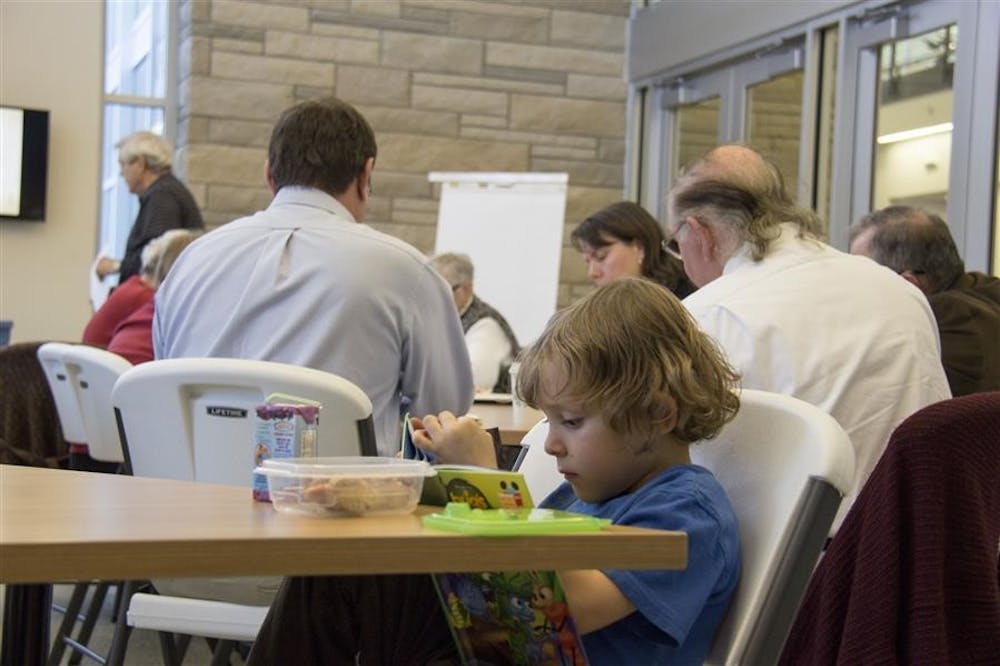The Indiana Coalition for Public Education and members of the community met Tuesday at the Northwest YMCA to discuss ISTEP and other standardized testing.
Phillip and Joan Harris, authors of “The Myths of Standardized Tests: Why They Don’t Tell You What You Think They Do,” led the meeting, which began with a question: “What do you think test scores tell us about students, teachers and schools?”
Attendees divided into groups, and many of the groups said testing can reveal the social-economic status of a student, but not much else. One group said the test does not reveal anything about what students need to be taught next.
“What’s interesting to me is what’s not there,” Phillip Harris said.
Phillip Harris said many standardized tests are group-based and group norms establish a passing score. He said the standardized tests are designed so half of students will score below average.
Phillip said test items are not objective because someone decides what item should be used to measure a certain skill. He said if a question is asked to a sample group and half the group answers incorrectly, it will be kept. But, if the whole group answers incorrectly or the whole group answers correctly, the question will be thrown out.
He said this method makes it seem like the test is objective, but he said the test is still made up by someone, created by trying to use science.
The Harrises then presented the group with a standardized test of their own. Each person was given a short paragraph and told to pick out the F’s on the page. Out of 18 people who took the test, only four counted the correct number of F’s.
Phillip said children’s test scores are compared to a group that no one knows anything about and that might be different from a student taking the test.
Phillip also mentioned that teachers don’t receive the results of what problems their students answered correctly and incorrectly, so teachers don’t know what their students aren’t learning properly.
“You don’t learn much from what you got right,” Phillip said.
As the meeting went on, those in attendance participated in another task. The Harrises passed out a cardboard square with a handmade ruler and participants were told to measure the square. Each ruler had a different unit of measurement and therefore everyone received different answers.
Phillip made the point that society has agreed upon units of measurement for many different things, but not for education, though he said people seem to think test scores are that unit.
He said proponents of testing conclude an indirect measure of knowledge, such as testing, is better than a direct measure of knowledge, such as a student’s actual performance.
“We shouldn’t let our children be subject to indirect observation,” Phillip said. “Period.”
He said the amount of students opting out of testing is growing.
Sofia McDowell attended the meeting with her son and said she is an active supporter of public education. She said it is important to address all aspects of education, including standards and accountability.
Gina Weir, a parent of two children in school, said she wanted to attend the meeting to discuss other ways of changing the testing system in place, which she said often discriminates against children of a lower socio-economic status or children whose first language is not English. She said testing starts making children compare themselves to other people.
She said a lot of money is being wasted on testing that could be spent on reducing class sizes so teachers can address the needs of all students. She said the current system penalizes schools and teachers based on an inaccurate measure of learning.
Phillip Harris said two of the biggest myths in testing are that scores can be used to evaluate schools and teachers.
Phillip said teachers shouldn’t be held accountable for other people’s behavior, similar to the way a dentist shouldn’t be held accountable for a patient’s bad teeth.
“Only in education do we expect teachers to be responsible for learning, when the learning is done by students,” he said.
Community decries ISTEP testing

Get stories like this in your inbox
Subscribe



